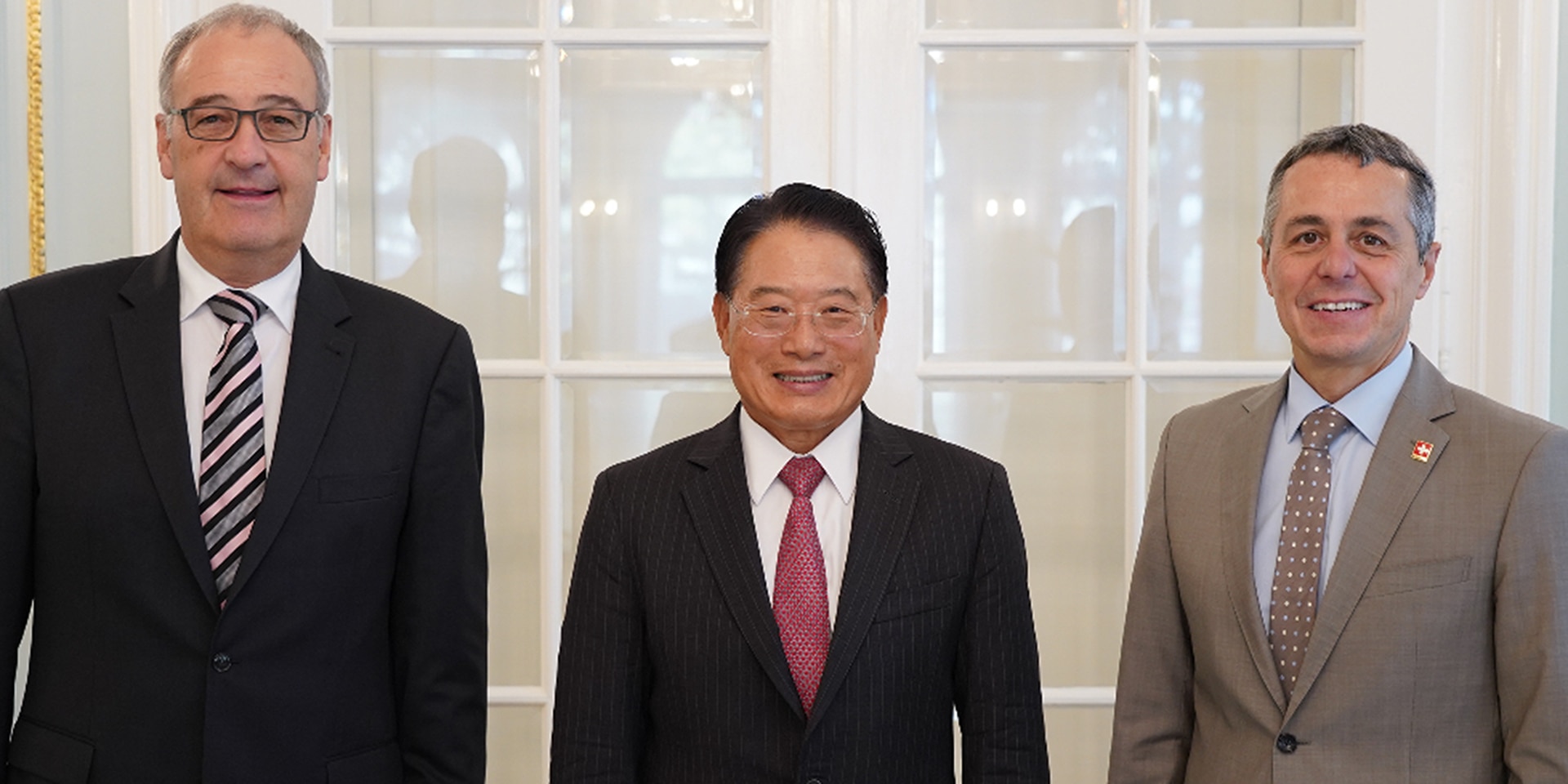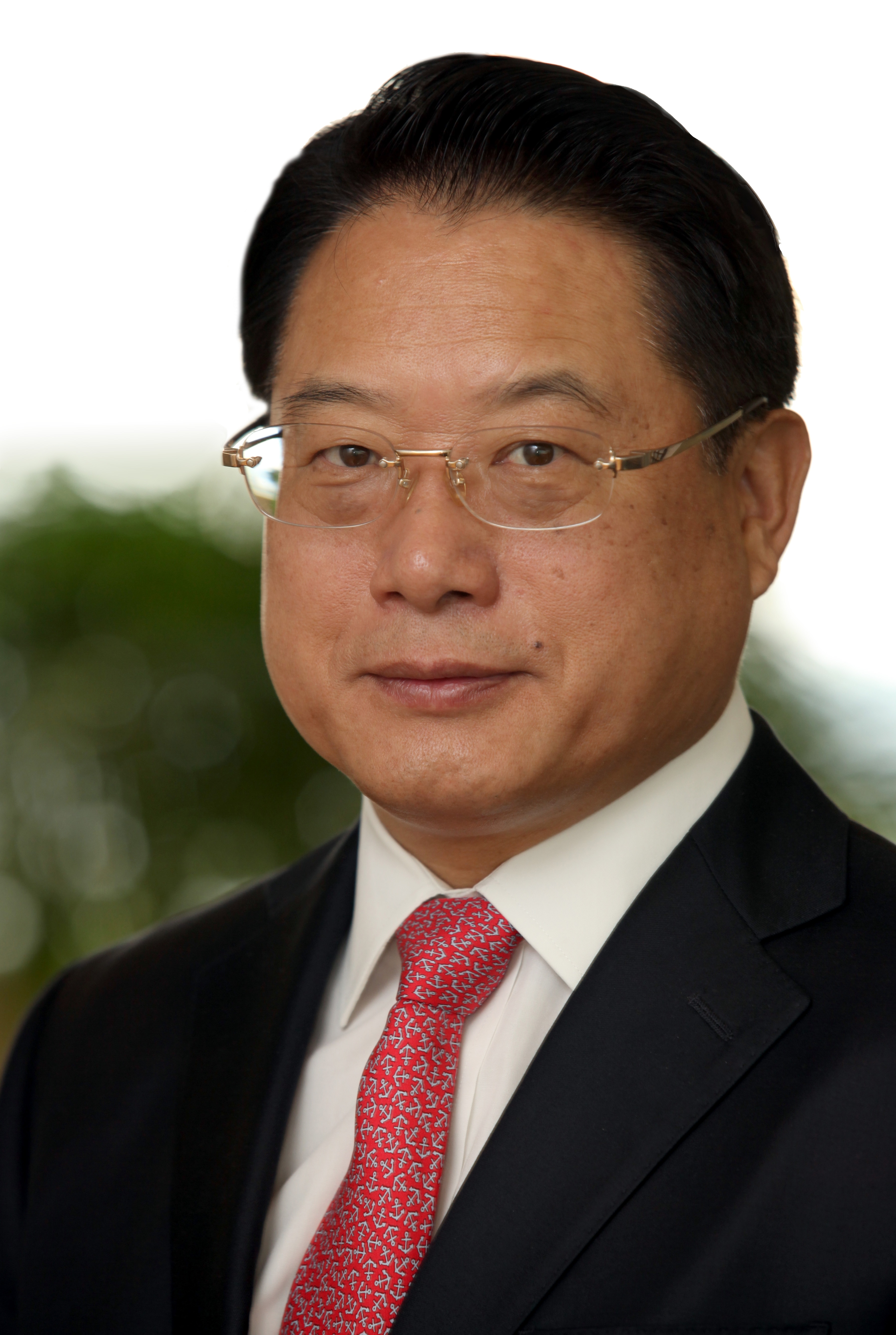“Switzerland plays a critical role in contributing to poverty reduction”
On 21 September 2020, the Swiss Parliament concluded its deliberations on the international cooperation strategy 2021–2024. In an interview following his recent visit to Federal Councillors Ignazio Cassis and Guy Parmelin, LI Yong, Director-General of UNIDO, also praised the strategy of Swiss development cooperation. The UN organisation is committed to sustainable industrial development.

During his visit to Bern on 9 September 2020, UNIDO Director-General LI Yong spoke with Federal Councillors Ignazio Cassis and Guy Parmelin, among other things, about Switzerland's new strategy for international cooperation. © FDFA
UNIDO is an important partner for Switzerland in international cooperation; in which areas do you work with the FDFA in Bern?
Switzerland is one of the strongest advocates of multilateralism in the world, and a most reliable and trusted partner in the implementation of technical cooperation activities, especially for UNIDO. The Organization not only relies on the outstanding technical excellence and expertise of Switzerland, it can also count on its political and financial support to address a wide range of development priorities, including:
Sustainable economic growth, market development and the creation of decent jobs
Addressing climate change and ensuring the sustainable management of resources
Quality services, skills development and job creation to diminish the causes of forced displacement and irregular migration
Inclusiveness and mainstreaming of gender equality and the empowerment of women
Partnerships – including with the private sector – to maximize developmental impact
Digitalization to accelerate inclusive and sustainable industrial development
Switzerland and UNIDO have a longstanding partnership history, which benefitted numerous stakeholders all over the world. During my recent official mission to Bern, I was pleased to note the close alignment of the Organization’s endeavors with Switzerland’s own development priorities.

LI Yong, Director General, United Nations Industrial Development Organization (UNIDO), has had an extensive career as a senior economic and financial policy-maker. As Vice‐Minister of Finance of the People’s Republic of China and member of the Monetary Policy Committee of the Central Bank for a decade, Mr. LI pushed forward financial sector reform, and prompted major financial institutions to establish corporate governance, deal with toxic assets and strengthen risk management. He played a key role in China’s cooperation with multilateral development organizations, such as the World Bank Group and the Asian Development Bank. © UNIDO
Today, the Swiss Parliament debated the new strategy for Switzerland’s international cooperation, which you also discussed with Federal Councilors Cassis and Parmelin. What do you think of the new strategy?
Switzerland’s International Cooperation Strategy 2021–2024 (IZA) reaffirms the country’s commitment to reducing poverty and promoting sustainable development in developing countries. I very much appreciate that the IC is a key component of the Federal Council’s Foreign Policy Strategy 2020–2023 and commend the comprehensiveness of the document, and how it highlights the importance of combining the strength of public and private actors to yield a maximum impact.
While the strategy clearly focuses on the needs of populations in developing countries, it very much promotes the strengths of the Swiss development cooperation, also by fully harnessing the potential of the private sector and digitalization. The IC further clearly lays out the need to work on a strong multilateral system, as the global challenges require the mobilization and cooperation of all, within the greater framework of public-private partnerships.
The strategy aims at strengthening cooperation with the private sector. In your view, is it a solution to fight poverty and create new perspectives?
UNIDO has always been convinced that inclusive and sustainable industrial development is achieved best through a coalition of development actors, and especially through the involvement of the private sector. Most, if not all UNIDO technical cooperation activities, whether in the field of poverty reduction or environmental protection, are carried out with and through the private sector. After all, the private sector creates 9 out of 10 jobs in the world!
Cooperation with the private sector can take on so many different dimensions: from investment to technology transfer, from capacity-building to market intelligence, from global supply chains to business partnerships. In UNIDO, we very much follow win-win developments, also by involving the private sector in the implementation of the Programme for Country Partnership (PCP), our flagship programme, and the operationalization of industrial parks.
As a result of the COVID-19 pandemic, poverty could rise by 420 to 580 million people – the first increase in three decades – with 70 to 100 million people at risk of falling back into extreme poverty. The support to and the cooperation with the private sector is of critical importance as we address the socio-economic impact of the COVID-19 crisis and as we build back better.
UNIDO promotes industrial development in its Member States. How does development cooperation contribute to industrial development?
Development cooperation is essential to the advancement of inclusive and sustainable industrial development, which in turn is the foundation of economic development in least developed and middleincome countries. But industrial development is so much more: it is a catalyst for change, and a common thread that links all societal activities. And while industrial development is essential to any country, development cooperation is crucial to make it happen in an inclusive and a sustainable manner, where it is needed the most.
The COVID crisis has made international support even more indispensable. As a result of the pandemic, and in addition to stalling trade and the decline in gross domestic product across the globe, also much needed foreign direct investments and remittances have dropped drastically. While governments struggle to finance the response to the pandemic and avoid a debt crisis, it is clear that development support to workers and to small and medium-sized enterprises and their owners is critical to avoid a worsening of the situation.
As a UN organization, you work with many states. What is Switzerland’s role?
One of UNIDO’s main functions is to act as a global forum for its Member States, where information and knowledge is exchanged. Switzerland, as a champion of multilateralism and as resolute donor, plays a critical role in promoting the Sustainable Development Goals and in contributing to poverty reduction and the protection of the climate.
The COVID-19 crisis is a strong reminder that the global challenges of today must be addressed together, as no single country can overcome this crisis on its own. Indeed, just like climate change, the pandemic is a global issue that can best be addressed by multilateral cooperation. Therefore Switzerland, also with the farsightedness that it showed through its IZA, is so critical to defend a strong multilateral system and mobilize partners worldwide to create prosperity for all.
UNIDO – A key partner in international cooperation
UNIDO (United Nations Industrial Development Organization) in 1966 as a specialised agency of the United Nations, with headquarters in Vienna. Its mission is to promote sustainable industrial development in its member states. The agency has been an important partner for Switzerland for many years, particularly in promoting the efficient use of resources and clean forms of production, as well as in strengthening quality infrastructure at the national level.
